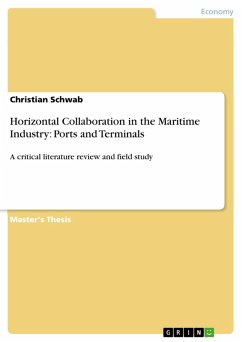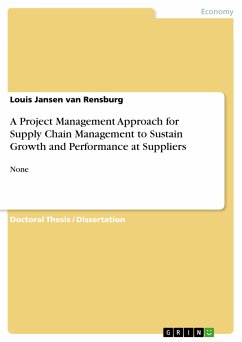
International Outsourcing: 3PLs (eBook, PDF)

PAYBACK Punkte
0 °P sammeln!
Scientific Essay from the year 2012 in the subject Business economics - Supply, Production, Logistics, grade: 100, , course: International Logistics Management, language: English, abstract: Increased globalization has led to the increased importance of Supply Chain Management for most businesses involved both domestically and internationally. Globalization has led to record levels of competition from competitors both domestically and internationally. The underlying factors involved in competitive pressure due to globalization are not only the trends of reducing the costs of procurement and dec...
Scientific Essay from the year 2012 in the subject Business economics - Supply, Production, Logistics, grade: 100, , course: International Logistics Management, language: English, abstract: Increased globalization has led to the increased importance of Supply Chain Management for most businesses involved both domestically and internationally. Globalization has led to record levels of competition from competitors both domestically and internationally. The underlying factors involved in competitive pressure due to globalization are not only the trends of reducing the costs of procurement and decreasing the risks related to purchasing activities, but also the need to develop competitive edge through core competencies which allow businesses to differentiate themselves from competitors and stand out in the market by offering not only a productivity advantage, leading to lower prices, but also a value advantage which differentiates its products from its competitors' products (Sovereign, 2008). Within a domestic market, productivity advantage has been a linchpin of a company's overall competitive advantage, enabling them to offer lower prices on the end product. However, the global market is more complex-often requiring a significant level of cultural intelligence and a vast knowledge of varying regulations and social issues prevalent within a company's target market. Companies often find that the level of attention, expertise and resources required for developing the relationships required to effectively manage logistical complexities involved in a multi-national supply chain to be prohibitive to the development of the very same core competencies required to maintain their productive advantages, and experience significant difficulty balancing the two aspects of international logistics management within their supply chains. Many have found the balancing act easier to accomplish through the outsourcing of logistical functions to third-party logistics providers (3PLs). [...]
Dieser Download kann aus rechtlichen Gründen nur mit Rechnungsadresse in A, B, BG, CY, CZ, D, DK, EW, E, FIN, F, GR, HR, H, IRL, I, LT, L, LR, M, NL, PL, P, R, S, SLO, SK ausgeliefert werden.













